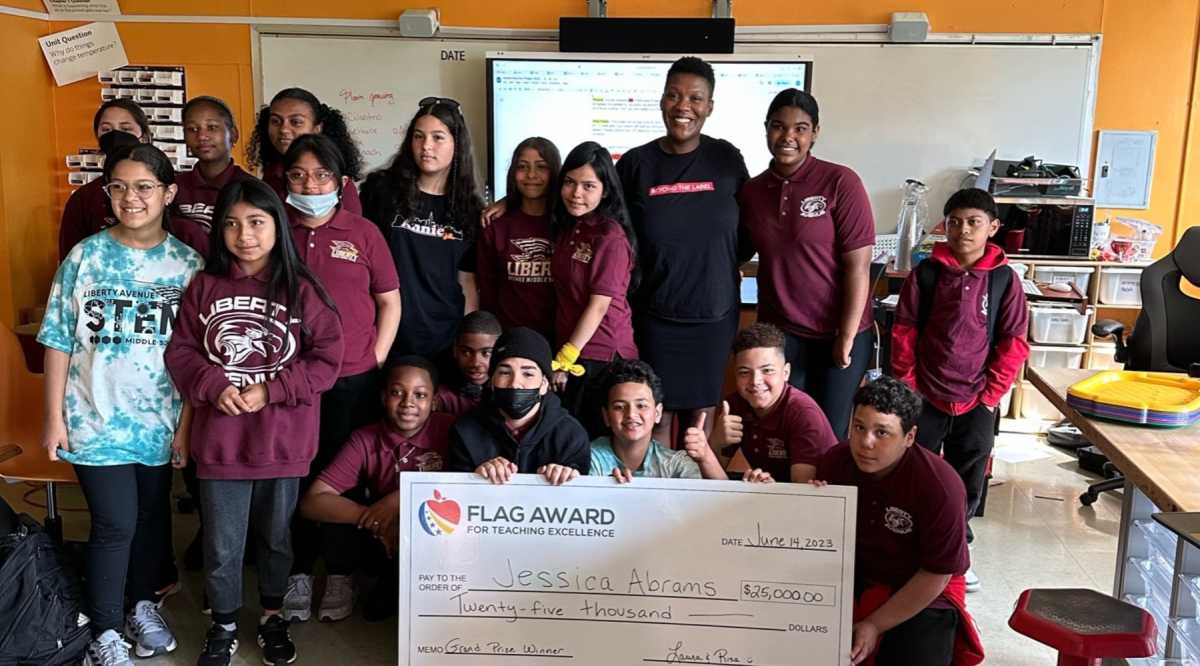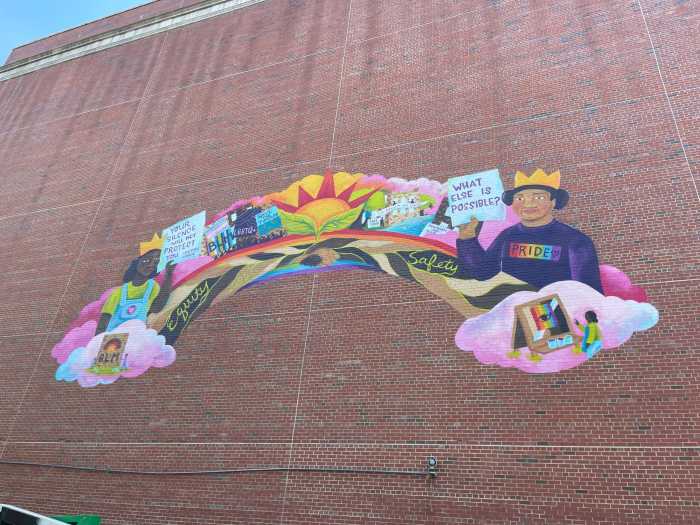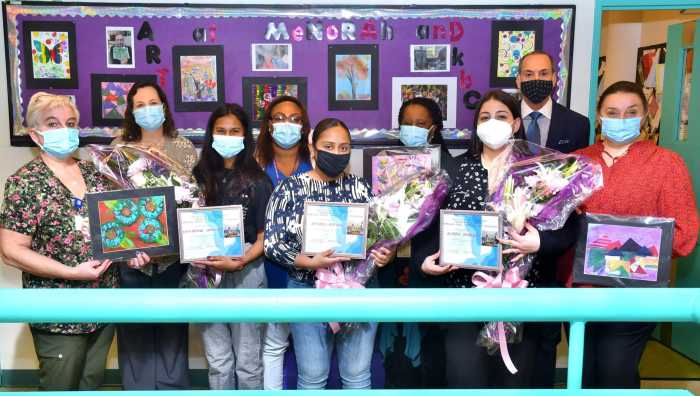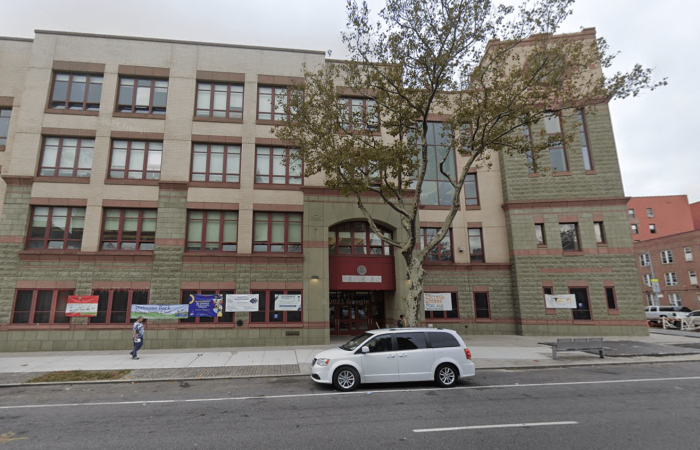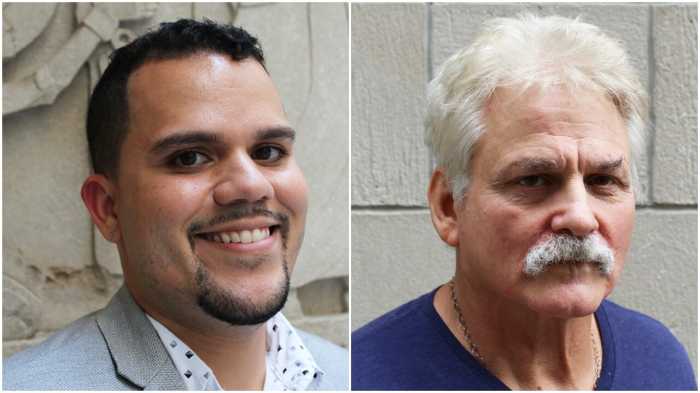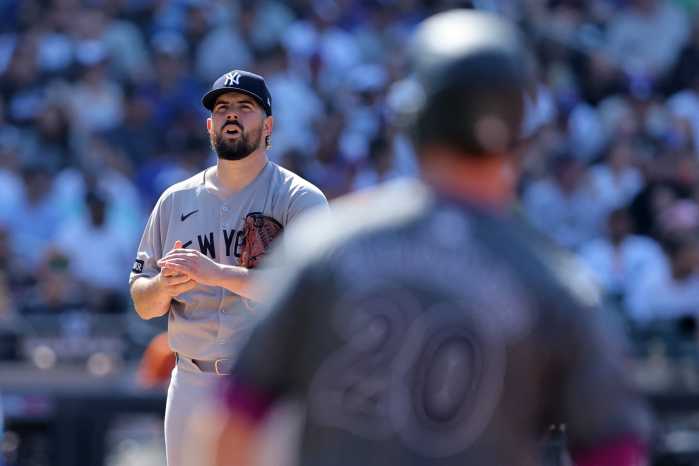Two Brooklyn teachers are among the six outstanding New York City educators being recognized for their work helping students become the best versions of themselves.
The FLAG Award for Teaching Excellence was this year awarded to Jessica Abrams, a STEM teacher at Liberty Avenue Middle School in East New York, and Sarah Slack, a science and STEM teacher at I.S. 223 Montauk Intermediate School in Borough Park.
Each grand prize winner will receive a $25,000 cash prize and a $10,000 grant for their respective schools. The complete list of grand prize winners and additional finalists and semi finalists will be announced later this month, among them seven other Brooklyn teachers.
As the only STEM teacher at her school, Abrams uses a self-designed curriculum to reach various learners and also teaches two dual-language science courses and a science enrichment class for gifted students. The FLAG award jury recognized Abrams for going above and beyond to show her students how what they learn in the classroom can be applied in the real world and for the creative ways she empowers her students to serve as leaders.
Some of her work noted by the jury included a student-led restorative justice circle and her role facilitating a girl’s group called Girls Empowerment Movement.
Recently, the GEM hosted a community town hall to better understand the food insecurity in their community and responded with action and service learning. They have been responsible for a community fridge and a clothing drive.
As a native East New Yorker, Abrams said growing up it was hard to find teachers who looked like her or recognized her plight as a first-generation American, but she still encountered educators who inspired her to “become as great as them.”
“I knew I wanted to give back to the community that gave so much to me, and I wanted to become the teacher that I always admired,” she told Brooklyn Paper, adding that the most rewarding part of her job now is when former students return to thank her for inspiring the same sentiment in them.
Still uncertain as to who put her name forward for the prestigious teaching award, Abrams said she was extremely humbled and grateful to be nominated “because sometimes in this profession you don’t feel seen or heard.”
On learning that she had won the grand prize, Abrams said she was grateful for the opportunity not only for herself but for the students.
“To have my students see their educator recognized does benefit them as they’re seeing their role model recognized and so that motivates them to want to learn and gain the skills that I’ve been trying to invest in them for the past couple of years,” she said.
She has yet to make solid plans for the $25,000 cash prize but hopes to take a vacation with her family, donate some to charity, and invest it back into her classroom. The $10,00 grant will go towards an outdoor classroom which will expand her hydroponics lab and create a sustainable community garden for the broader community.
A testament of her dedication to her students, Abrams said she will be working over the summer to get the outdoor space ready when school starts again on Sept. 8.
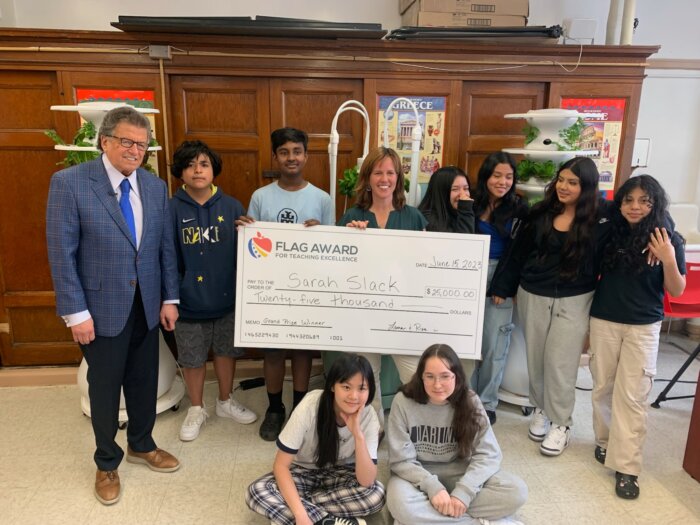
Now in its fourth year, the FLAG Award for Teaching Excellence has recognized 122 teachers across the five boroughs and given away $1,130,000 in prize money.
This year’s competition received the most nominations in its history, with 1,337 submissions from students, parents, principals, and teachers. Thirty-five semifinalists were selected from the nominees and were required to complete a comprehensive application, participate in an interview process that included an interview with their principal, and submit supplementary material.
The jury picked Slack as a grand prize winner for not only teaching science but for educating her students to learn the associated skillset and critical thinking skills that come with technical knowledge.
She previously received a grant to acquire multiple hydroponics towers installed throughout the school, which she uses to build connections with other subjects.
“I don’t want to just teach my students science; I want them to learn what it means to be a scientist. I hope that my students develop their ability to carefully observe their environment, to use critical thinking and engineering design skills to overcome a challenge and to back up their claims with evidence,” said Slack. “I am incredibly grateful for this recognition from the FLAG Foundation, and I hope it shows my students that the work we do in our classroom is meaningful.”
Slack has encouraged her students to create connections to the larger world of science by going above and beyond by taking advantage of research opportunities that she infuses into lessons in the classroom.
She has studied wolves across North America to develop a lesson on evolution, traveled to Antarctica to study glaciers and the effects of climate change, and spent a year working on a research team with NASA’s Climate Change Research Initiative.
Outside of the classroom, Slack engages in many opportunities to improve the quality of science education and increase access to engaging resources on a broader level. She is the District 20 STEM coach, helping create district-wide STEAM events; and also works on the Middle School Science Leadership team, is a co-chair of the NYCDOE’s Climate Education Leadership Team, and is also working with the NYCDOE’s Office of Sustainability on a Professional Learning series in which more than 100 teachers learn how to incorporate climate education into their classrooms.
“There are so many amazing educators, and we are glad we can honor a few individuals who have made a lasting impact on the lives of their students,” said Risa Daniels, co-president of the FLAG Award. “Great work shouldn’t go unnoticed, and I’m thrilled we could recognize and reward these outstanding teachers,” added Co-President Laura Twersky.
This year’s finalists from Brooklyn include Brittany Beck from High School of Telecommunication Arts and Technology, Joseph Alvear of Fort Hamilton High School, and Sasha Roopchand from The Brooklyn Green Magnet School for Eco Activism.
All finalists will receive $10,000 for their personal use, and their schools will receive $5,000 each to use toward an arts-based initiative. The 19 semi-finalists will receive $1,000 for their personal use, and their schools will receive $1,000 each.



